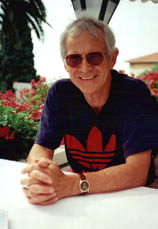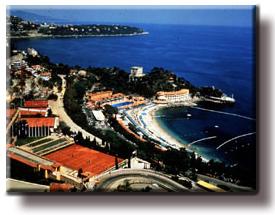
Finding Games and Making Friends on the Road
TennisONE Travel Editor

How
to Get a Match in Strange Places like Spain or Indiana
You're going on a trip - business, pleasure, maybe a little of both - to Ireland, Italy, or Indianapolis. You'll have time for tennis, but you know neither places nor partners. Playing can be a lot of fun: good exercise, a break from the routine, a way to see new places as something other than a complete outsider. So what do you do? You can't just wander over to a club or municipal center in hopes of finding a game. Dropping in where nobody knows you or your game can bring a curt, unhelpful response from the people in charge, an interminable wait, a mismatch, or no match at all.
The key to playing
on the road is setting the wheels in motion in advance. This
means utilizing what journalists call your best sources. Who
are they? A wide range of people - at home or at your destination
- who can refer you to decent courts and to players at your level.
I learned this from experience - the hard way! It occurred in the early 1980s, in San Sebastian, Spain, but it could just as well have been Indianapolis. I located San Sebastian's grand old tennis club and walked in ready to play. I explained I was a tournament-quality player looking for somebody comparable to hit with. Clearly, the people in the pro shop didn't believe me. Although good players were on hand, I was paired with not one but a series of hackers, and it took me two hours and three boring non-sets to literally work my way up to an enjoyable match. You can't really blame the local club employees for taking that attitude. Their job is to keep the members happy, and people often exaggerate their tennis ability. Why risk setting your "boss" up with a stranger?

|
So-so players risk another type of uncomfortable situation, being embarrassed by a pairing with somebody far too strong. What you want is parity because that makes everybody happy. And don't be deterred by language differences because in the tennis community, even more than in the broader world, English is pervasive. Chances are good that, in the country you're visiting, somebody in your chain of sources will speak enough English to get the job done. Chances are equally good - because tennis really has something of a community - that the somebody will be willing to make the key call for you in Spanish, Arabic, or whatever.
If Spain is too exotic an example to convince you, here's one closer to home with a better outcome. My wife and I recently went to Annapolis, Maryland, to house sit. I knew of no good players in the area, but Bob, a member of my indoor doubles group, gave me the name of an Annapolis teaching pro named Paul. A quick call to Paul, establishing that I played at Bob's level, produced three names and three good games. One of the new partners and I were so compatible that we played again later in the week and then in Washington, where I live and he works.
If you or your friends don’t know anyone where you're traveling, borrow a USPTA or a USPTR directory from your pro. They list thousands of pros in the U.S. and overseas. A few calls should establish where the players are and where tennis matchmaking is a regular part of the program. Many resorts are, in fact, eager to hear from visiting players, whether you are staying at the resort or not. They want their guests to find good matches.
Don't forget two
other handy basic sources. For trips abroad, the embassy of the
country you're visiting can look up the phone/fax numbers of
the country's tennis association. Better still, for foreign or
domestic trips, is our own USTA. It has the addresses and phone/fax
numbers of all of the sport's "national governing bodies,"
as the national associations are formally called, and will readily
provide contacts at the USTA sectional offices. Start with the
office in your section and, if necessary, go on to headquarters
in White Plains, New York (914 696-7000).
BUT
what if you can't or don't want to check in advance? In that
case, get the phone book and call around as soon you arrive.
Your best bets are the bigger municipal facilities or the clubs
or resorts that allow visitors to play. Talk with a pro who knows
the players well. If you have an NTRP rating or a ranking, mention
it to him or her; otherwise, be as briefly precise as possible
about your game (avoid "Umm, I'm pretty good"). Remember
the “Everybody Happy” rule I cited above and don't exaggerate
your ability. If the first places you call don't set up matches,
ask them what facilities do. Be persistent and, sooner or later, you're
likely to find someone who'll help..
In sum, think one word: CONTACTS. You may need several of them or you may need to develop new ones, and you may have to be patient. Sort of like keeping the ball in play before you get a shot you can put away. Think of it as an adventure - you'll get to play some new opponents and maybe make some friends in far-off places.
Roger M. Williams is a nationally known tennis and travel writer. He has been a Contributing Editor for Tennis Magazine for almost 20 years and has also written about tennis for such magazines as Conde Nast Traveler, Men's Journal, and Town & Country. Roger is the co-owner of TennisTravel which takes groups to Europe to play matches against club teams
Last Updated 9/1/98. To contact us, please email to: webmaster@tennisone.com
TennisONE is a registered trademark of TennisONE and SportsWeb ONE; Copyright 1995. All rights reserved.
